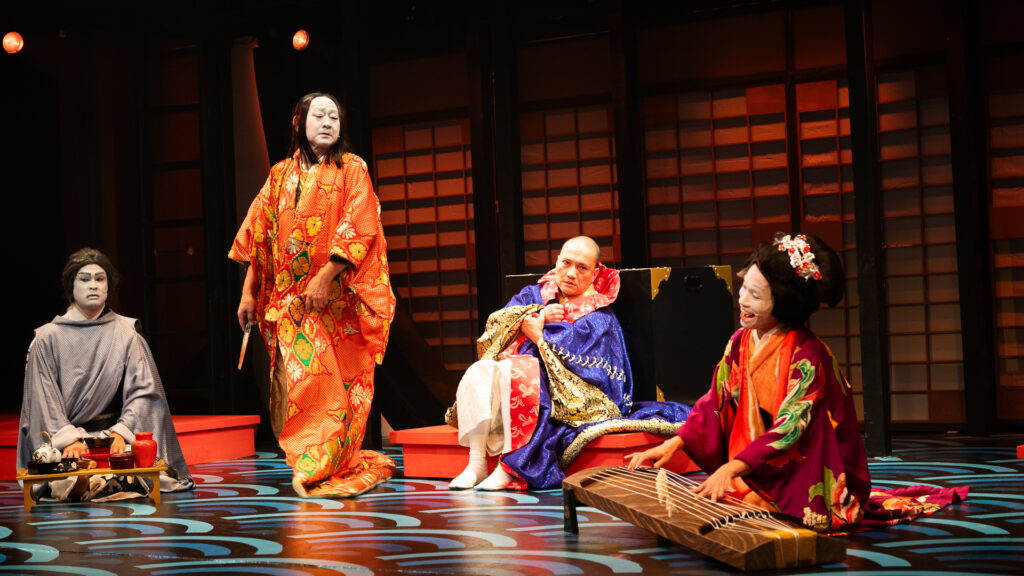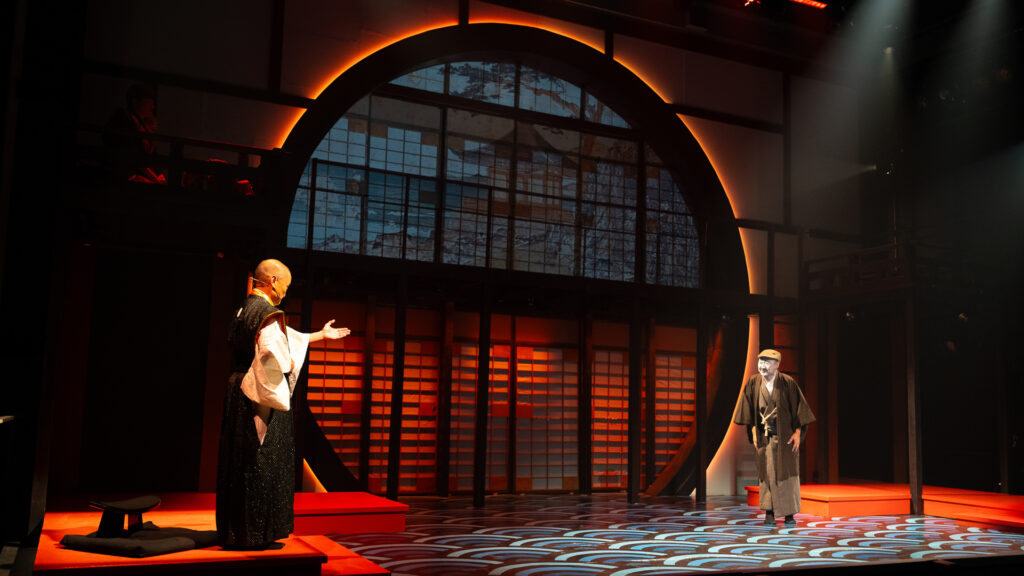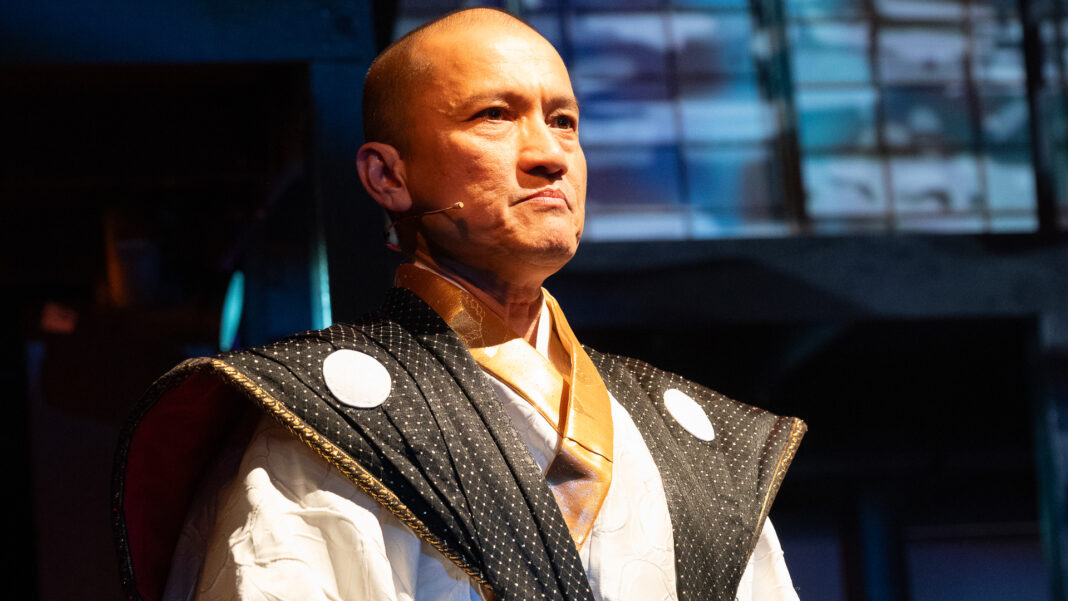Much like the Emcee in Cabaret, the role of The Reciter in the Stephen Sondheim/John Weidman musical Pacific Overtures is our guide into a world unlike our own. The Reciter is also much more than that as actor Jon Jon Briones (Miss Saigon Broadway revival; Hadestown) discovered when he agreed to take on the role.
Briones is starring in the East West Players new production of Pacific Overtures. The show also features Gedde Watanabe, Scott Keiji Takeda, Brian Kim McCormick, Adam Kaokept and Kerry K. Carnahan. Tim Dang directs.
Stephen Sondheim said his musical was, “The most bizarre and unusual musical ever to be seen in a commercial setting.” His certainly untraditional show, which opened on Broadway in early 1976, tells the story of Commodore Matthew C. Perry’s arrival in Japan in the mid-19th century and how his efforts to open up the isolationist country are experienced – through the eyes of the Japanese.
Charles McNulty, writing in the Los Angeles Times, raved about East West Players’ revival saying, “The new revival of Pacific Overtures may be the most impressive production I’ve seen anywhere all year.”
The path to get there was one filled with questions for Briones that didn’t always possess easy answers. This was amongst the many things I learned in my interview with Briones. What follows are excerpts from our conversation that have been edited for length and clarity. To see the full interview, please go to our YouTube channel.

Q: We know that many of Sondheim’s musicals were not always well-received when they were originally produced, but that time and audiences have caught up to those shows. Do you think time has caught up with Pacific Overtures? Are audiences maybe more open now to what this show is than they have been at any other point?
I think so. When they mounted this show in 2004 it didn’t last very long on Broadway. I think it’s still hard for the general audience members to to appreciate something that they think they won’t get or won’t relate to because…This might be controversial, but it’s all Asian. The King and I has that really main character that is Caucasian. Pacific Overtures, Sondheim and Weidman, they wrote something that they wanted. I think they thought they were trying to be true to the culture. The music is beautiful, but it’s really something different. Even to me, I go, what is the meaning of this? I understand it better now, but I have questions.
I read in an interview you and Gedde did with Pasadena Weekly that your first reaction was one that a lot of people have; that you didn’t fully understand it and that there were a lot of questions. Having worked on it now for as long as you have prior to opening, have you been able to sort out a lot of those questions? Do you understand more about what this show is doing, what it’s saying and how your character, The Reciter, plays a role in that?
I’ve reached that. In my career if I don’t really understand something, I try to understand it the way I would and believe it and stick to that so that I can I can grab on to my reality. I think that’s what I did right now. My understanding of it is maybe different from the original idea of Sondheim and Weidman. But I’m sticking to that because I think my understanding of it is something beautiful, kind of universal.
I would assume that, like many actors, you’re intrigued by the things that scare you. How much did being part of Pacific Overtures scare you?
Petrified! Especially the way Tim wants to do this. He wanted to be true to the original vision of Sondheim and Hal Prince, which is Kabuki. And I’m not Japanese. And Kabuki, they’ve been studying this since they were children. So it’s something set and there’s truth in how they do it. I told Tim this. I don’t want to do something generic because I might offend people. But he said, you know, just find yourself. Find whatever is true with a hint of that. I think we found a happy medium there.
You were born in the Philippines. There is a lot of dialog going on about whether people have to have lived-in experiences to play a character. I understand that intellectually, but practically, aren’t we negating what actors do?
That was one of the things that I been struggling with, especially when opportunities opened up for Asian actors. We kind of limited ourselves after that because they’ve been saying Japanese stories should be told by Japanese people and Chinese stories and Korean stories should be… And I get that because the opportunities are so few and that they wanted it to be done properly. I get that. But if it is in English, I think that should not be the case. We’re not speaking Japanese. We’re not speaking Cantonese or Korean. It’s in English. And we can bring in our own experiences because all experiences are relatable. They happen to everyone in China and in Japan and in Timbuktu. They’re all the same. It’s human experience and we all have that and it should be valued.
What discoveries did you make about this story and your journey to get to opening night and about the character of The Reciter?
That’s a good question. I’ve discovered about how to tell a story of an experience that happened a long time ago. And making it entertaining. But at the same time valuing the journeys of each character. And telling stories of so many characters. I asked Tim, why am I telling this story? What is the purpose of this? And then he said, Yeah, that’s a good question. Who do you think is telling this story? Are you Japan? Are you the emperor? Because the emperor back then was a one-year-old baby. He goes on to add that this story is about change and how the changes got to certain people. It got violent. It was funny. It was scary. And all of those things are helpful information to get to the finale of the storytelling.
That makes me think of Someone in a Tree, which is different perspectives on the same story being told simultaneously. Sondheim said that was his favorite song he ever composed. What about that song resonates most with you?
I saw an interview or something that Lin-Manuel Miranda wrote that one of the inspirations for In the Room Where it Happens [from Hamilton] was Someone in a Tree. There is always a a bystander looking and observing and they have an opinion of what happening. Which is so interesting because that’s why there are so many versions in history. Who is a witness to your history? Even if they don’t have a firsthand account, it’s going to be out there. It’s going to be told. That’s why I love the power of storytelling.
If we if we look back on the history of East West Players, Stephen Sondheim and Pacific Overtures are inextricably linked throughout its history because East West Players was founded by Mako, who originated the role you’re playing in the original production of Pacific Overtures. I know that Sondheim invested in East West Players and multiple productions of Sondheim’s have been done there. What do you think it means to the company, and what does it mean to you, to be bringing a new production of this musical that is so intricately tied to the history of East West Players?
That even though Sondheim is not here, he still has a very loud voice. That he is still making things happen from where he is. He wants this because I read that he was not really satisfied with everything. It’s an unfinished symphony. I think maybe he wants us to discover it and make it better. This is what I found out about him. He is not precious with this work. Gedde [who appeared in the original production of Pacific Overtures] had stories he was telling us. He is open to two things. If you want to cut that scene short, cut that scene if you want to. You want more of that? Sure, I’ll write some more of that. He will never be satisfied with his work because nothing is perfect. Art is never perfect and he embodied that.

In the last song in Pacific Overtures, “Next,” the outsider says “There was a time when foreigners were not welcome here, but that was long ago.” In light of the elections this week in America, where anti-immigrant sentiment was a huge part in motivating people to vote for one candidate over another, what power does Next have in the show that may be different than it would have had if the election gone differently?
To me, it’s very hopeful. It came from the people who historically went, No, don’t! We’re fine here. Don’t. Don’t bring that. But because of the forceful and kind of violent interaction from the West, you can’t really stop progress. You can’t stop betterment. You can harness it, you can manipulate it. You can, you know, make it better. But it’s going to come. That is why I think even though a lot of people are heartbroken, it will get better. In Pacific Overtures, they made it Japan. It was given to them. Violently. But they brushed themselves up and started all over again. And they made it better. We can make this better. We can learn something from this. We can overcome this because we are resourceful and we know ourselves. We know what we can do. If only we think a a community, as a country, together as one, we can accomplish anything and we can be better than before.
Pacific Overtures runs at East West Players through December 1st. For tickets and more information, please go here.
To watch the full conversation with Jon Jon Briones, please go here.
Main Photo: Jon Jon Briones on Pacific Overtures (Photo by Teolindo/Courtesy East West Players)











